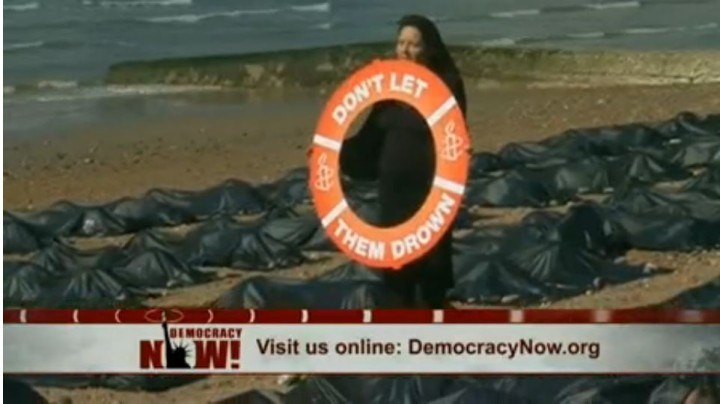The European Union is expected to ask the United Nations Security Council today to permit military action against human traffickers operating out of Libya. The U.N. estimates more than 60,000 people have already tried to cross the Mediterranean from Libya into Europe this year. Over 1,800 migrants have died in the attempt, 20 times more than the same period last year. Meanwhile, the European Commission is due to make a proposal that member countries take in refugees under an E.U. quota system. The European Commission’s migration policy will also propose organizing legal means for migrants to come to Europe so they don’t turn to traffickers. This comes as a new report by Amnesty International reveals how migrants are forced to flee Libya because of “horrific abuse.” The report is based on interviews with refugees and migrants across Libya who face “rape, torture and abductions for ransom by traffickers and smugglers, as well as systematic exploitation by their employers, religious persecution and other abuses by armed groups and criminal gangs.” We are joined by the report’s author, Magda Mughrabi, Libya Researcher at Amnesty International.
Transcript
This is a rush transcript. Copy may not be in its final form.
AMY GOODMAN: Today the European Union is expected to ask the United Nations Security Council to permit military action against human traffickers operating out of Libya. The U.N. estimates more than 60,000 people have already tried to cross the Mediterranean from Libya into Europe this year. Over 1800 migrants have died in the attempt, 20 times more than the same period last year. Britain is drafting the resolution that would authorize the mission and today the EU’s Chief Foreign and Security Policy Coordinator Federica Mogherini will brief the Security Council on plans for a Chapter Seven resolution authorizing the use of force. Meanwhile, the European Commission is due to make a proposal that member countries take in refugees under an EU quota system. The European Commission’s migration policy will also propose organizing legal means for migrants to come to Europe so they don’t turn to traffickers. This policy is expected to be announced Wednesday. Germany is one of the main country’s backing quotas. This is German Chancellor Angela Merkel.
CHANCELLOR ANGELA MERKEL: There are countries which are interested in taking in refugees and which find it right. Germany is among them and so is Italy, France, Greece, Sweden, and Malta. So there’s a large group of countries and then there are other countries which may be don’t see this necessity as urgently. They are arguing for voluntary basis. But I’m convinced that it will become clear that especially with the countries confronted with refugees from the Mediterranean, that there will be no alternative to European solidarity to get to a solution.
AMY GOODMAN: This comes as a report released today by Amnesty International reveals how migrants are forced to flee Libya because of “horrific abuse.” The report is based on interviews with refugees and migrants across Libya who face “rape, torture and abductions for ransom by traffickers and smugglers, as well as systematic exploitation by their employers, religious persecution and other abuses by armed groups and criminal gangs.” It also finds conditions in Libya migrant detention centers inhumane. As one of the Syrian families interviewed said, “We were facing death in Libya, so we thought we might as well face death in trying to get to Italy.” Well, for more, we go to London to speak with the author of the amnesty report titled, “Libya is full of cruelty: Stories of abduction, sexual violence and abuse from migrants and refugees.” Magda Mughrabi is a Libya Researcher at Amnesty International. Magda, welcome to Democracy Now! Talk about what you have found.
Read the Full Transcript in Democracy Now!






